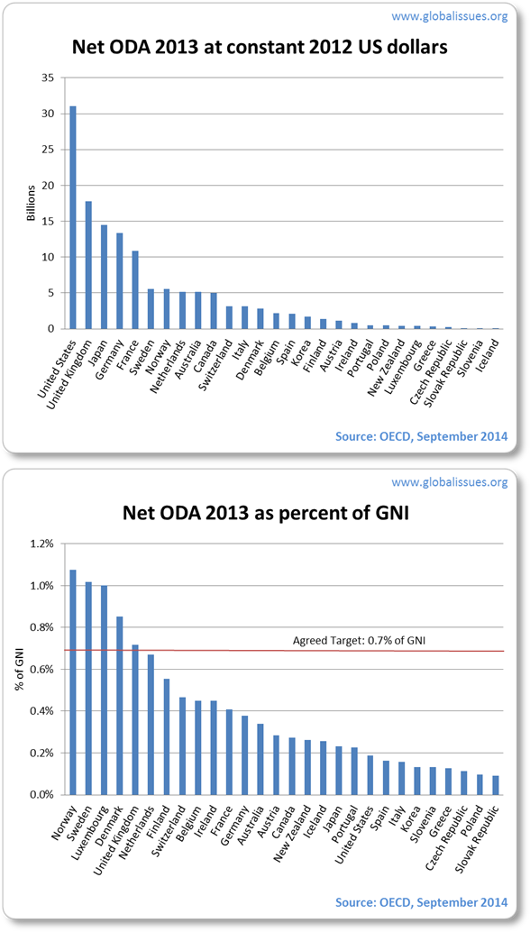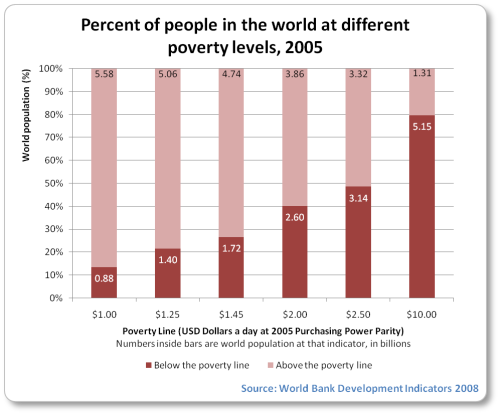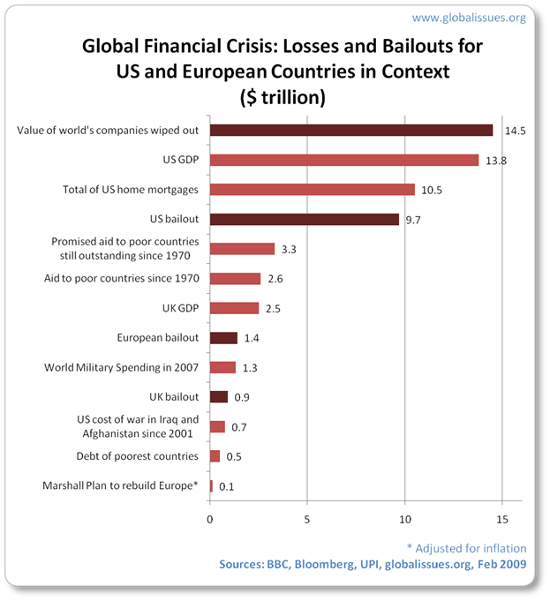Today, around 21,000 children died around the world. This daily tragedy, from poverty and other preventable causes, rarely makes headline news.
Latest world news
World
Rainy Chilo鬠in Southern Chile, Faces Drinking Water Crisis
- Inter Press Service

SANTIAGO, May 02 (IPS) - The drinking water supply in the southern island of Chiloé, one of Chile's rainiest areas, is threatened by damage to its peatlands, affected by sales of peat and by a series of electricity projects, especially wind farms.
We Should Aim to be at Peace with Nature, Says David Cooper of UN Convention on Biological Diversity
- Inter Press Service

HYDERABAD & MONTREAL, May 02 (IPS) - In a world faced with habitat loss and species extinction, climate change, and pollution, it’s crucial that countries develop their national action plans and create a society that lives in harmony with nature, says David Cooper, Acting Executive Secretary of the UN Convention on Biological Diversity (CBD), in an exclusive interview with IPS.
World News in Brief: Palestinian journalists win top press freedom prize, child migrant detention, Niger meningitis epidemic
- UN News
The Palestinian journalists who have been covering the devastating war in Gaza were named winners of the UNESCO/Guillermo Cano World Press Freedom Prize on Thursday.
UN rights chief urges Georgia to scrap ‘foreign influence’ bill
- UN News
As protests continue in Georgia over a proposed draft law on curbing foreign influence, UN Human Rights Commissioner Volker Türk on Thursday urged the authorities to shelve the controversial bill and engage in dialogue.
Sudan: Under siege, El Fasher teeters on the brink of famine
- UN News

The ongoing year-long war in Sudan continues to spread across the country, and now El Fasher, the capital of North Darfur, is surrounded by armed fighters amid the systematic burning of entire villages, escalating air strikes and blocked aid deliveries.
Stories from the UN Archive: UN camel caravans deliver
- UN News

Camels, long known as the ships of the desert, have played an important role helping the UN from as early as the 1940s in driving up global vaccination rates and delivering lifesaving aid.
Refugee Olympic Team to send message of hope at Paris Games
- UN News
Afghanistan’s first woman breakdancer, a Cameroon-born British boxing champion, and a literal shooting star from Venezuela are among the members of the Refugee Olympic team competing at the Paris Games, which begin in July.
Palestine’s economy in ruins, as Gaza war sets development back two decades
- UN News
The relentless Israeli offensive in the Gaza Strip has set back Palestine’s overall socio-economic development by more than 20 years, according to a new UN report released on Thursday.
Gaza’s new terror: Booby-trapped cans of food for the unwary
- UN News
Almost seven months into the devastating war in the enclave, Gazans face a new threat: booby-trapped food.
How Israel Has Used US Weapons to Commit War Crimes
- Inter Press Service
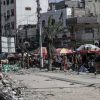
NEW YORK, May 02 (IPS) - The report from Amnesty International USA comes ahead of a May 8 deadline for the Biden administration to certify that Israel is complying with international and domestic laws.
- More stories…
Climate
Rainy Chilo鬠in Southern Chile, Faces Drinking Water Crisis
- Inter Press Service

SANTIAGO, May 02 (IPS) - The drinking water supply in the southern island of Chiloé, one of Chile's rainiest areas, is threatened by damage to its peatlands, affected by sales of peat and by a series of electricity projects, especially wind farms.
We Should Aim to be at Peace with Nature, Says David Cooper of UN Convention on Biological Diversity
- Inter Press Service

HYDERABAD & MONTREAL, May 02 (IPS) - In a world faced with habitat loss and species extinction, climate change, and pollution, it’s crucial that countries develop their national action plans and create a society that lives in harmony with nature, says David Cooper, Acting Executive Secretary of the UN Convention on Biological Diversity (CBD), in an exclusive interview with IPS.
Press Freedom and Climate Journalism: United in Crisis
- Inter Press Service

ROME, May 01 (IPS) - Journalism is in crisis, again. The challenges to press freedom are enormous and multi-faceted and they are deepening -- in “free” and open societies as well as autocracies. And there are no simple solutions.
Drought and Unequal Water Rights Threaten Family Farms in Chile
- Inter Press Service

QUILLOTA, Chile, Apr 30 (IPS) - For the rural farmers in Chile, a combination of climate change-induced mega droughts, water policies that make access unaffordable and a State that either doesn’t want to or dares not intervene in the water market means family enterprises are dying out.Lack of water threatens the very existence of family farming in Chile, forcing farmers to adopt new techniques or to leave their land.
World News in Brief: DR Congo conflict could spell catastrophe, plastics treaty progress, enforced disappearances rise ahead of Venezuela poll
- UN News

The world’s leading humanitarian action forum on Tuesday said that crushing levels of violence and displacement are fuelling unprecedented civilian suffering in the eastern part of the Democratic Republic of the Congo (DRC).
Could the answer to 100% renewable energy in Dominica be under the ground?
- UN News

A small but growing number of countries are well on their way to producing all of their electricity from renewable sources. Dominica, in the eastern Caribbean, is planning to join these pioneers and become the first small island developing State (SIDS) to stop using fossil fuels for energy generation.
Using Industrial Waste to Fight Pollution in Brazil
- Inter Press Service

CHAPECÓ, Brazil, Apr 29 (IPS) - Biogas sounds like redemption, the conversion of the sinner. Its production involves extracting energy from filth, from the most disgusting environmental pollution, and at the same time avoiding the worsening of the global climate crisis.
UN officials urge swift action to tackle El Niño-induced extreme weather
- UN News

Top UN officials called on Monday for swift action to combat the El Niño extreme weather events that are currently devastating southern Africa and other regions with flooding and drought.
Cuban Family Harnesses Biogas and Promotes its Benefits
- Inter Press Service

HAVANA, Apr 26 (IPS) - Just to obtain a good fertilizer it was worth building a biodigester, says Cuban farmer Alexis García, who proudly shows the vegetables in his family's garden, as well as the wide variety of fruit trees that have benefited from biol, the end product of biogas technology.
Climate Crisis in Mountains: Borderless Struggle for Frontline Communities
- Inter Press Service
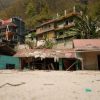
KATHMANDU, Nepal & SIKKIM, India, Apr 26 (IPS) - Climate change-induced flooding has devastated the lives of people living on the Indian and Nepalese sides of the Hindu Kush Himalaya. Although the floods have destroyed their lives and livelihoods, as this cross-border collaboration narrates, neither community has received any substantial compensation.For the last three years, Sambhunath Guragain has been waking up every morning to a view he doesn't want to see: discarded agricultural land where he and his family used to grow food, including rice, but the flood in 2021 changed everything.
- More stories…
Health
Europe: Report highlights direct link between pandemic and childhood obesity
- UN News

The COVID-19 pandemic has led to increased obesity in school-aged children in Europe, the World Health Organization (WHO) office for the region said in a new report issued on Wednesday, sounding the alarm for action.
Transgender Health Rights Boosted by Hospitals' Separate Room Policy
- Inter Press Service

PESHAWAR, Pakistan, Apr 30 (IPS) - Transgender people and civil society organizations have welcomed the decision of the chief minister in Khyber Pakhtunkhwa, Pakistan, to allocate separate rooms in hospitals for the transgender community so they can avail themselves of uninterrupted healthcare.
WHO Africa Advances African Science by Promoting Peer-Reviewed Rese
- Inter Press Service

NAIROBI, Apr 29 (IPS) - The World Health Organization's African regional office and partners published over 25 peer-reviewed articles in scientific journals in 2023 as part of efforts to address the imbalance in global research and ensure that Africa was better represented in the production of health research academic literature, a new report shows.
‘Just in case’ antibiotics widely overused during COVID-19, says UN health agency
- UN News

Antibiotics saw “extensive overuse” globally among hospitalized COVID-19 patients during the pandemic without improving clinical outcomes, while also potentially increasing the already serious and growing threat of antimicrobial resistance from "superbugs"the UN World Health Organization (WHO) said on Friday.
Gender therapy review reveals devastating impacts on teens
- UN News

A top Human Rights Council-appointed expert has welcomed the decision by all health authorities in the United Kingdom to halt the routine use of puberty-blockers offered to children as part of gender transition services, amid a sharp increase more widely in the number of teenage girls seeking such treatment and concerns that it might disrupt brain development.
Teen alcohol and nicotine use in Europe is up, WHO urges preventive measures
- UN News

Smoking and drinking is on the rise among teenagers in Europe, Central Asia and Canada, and girls now match or even exceed boys when it comes to substance use, the World Health Organization (WHO) said in a new report on Thursday.
New global campaign boosts lifesaving vaccines
- UN News

Two UN agencies alongside the Bill and Melinda Gates Foundation and the global vaccine alliance Gavi launched on Wednesday a campaign to scale up programmes to save lives, marking the start of World Immunisation Weekcelebrated annually during the last week of April.
Latest hunger data spotlights extent of famine risk in Gaza, Sudan and beyond
- UN News

Dangerous levels of acute hunger affected a staggering 281.6 million people last year – the fifth year in a row that food insecurity has worsened – heightening growing fears of famineand “widespread death” from Gaza to Sudan and beyond, UN agencies warned on Wednesday.
Heatwave deaths increased across almost all Europe in 2023, says UN weather agency
- UN News

Climate change shocks caused record levels of disruption and misery for millions in Europe in 2023 with widespread flooding and severe heatwaves – a new normal which countries must adapt to as a priority, the UN weather agency said on Monday.
Pandemic experts express concern over avian influenza spread to humans
- UN News

The ongoing global spread of “bird flu” infections to mammals including humans is a significant public health concern, senior UN medics said on Thursday, as they announced new measures to tackle airborne diseases.
- More stories…
Economy
Rainy Chilo鬠in Southern Chile, Faces Drinking Water Crisis
- Inter Press Service

SANTIAGO, May 02 (IPS) - The drinking water supply in the southern island of Chiloé, one of Chile's rainiest areas, is threatened by damage to its peatlands, affected by sales of peat and by a series of electricity projects, especially wind farms.
Palestine’s economy in ruins, as Gaza war sets development back two decades
- UN News
The relentless Israeli offensive in the Gaza Strip has set back Palestine’s overall socio-economic development by more than 20 years, according to a new UN report released on Thursday.
Could the answer to 100% renewable energy in Dominica be under the ground?
- UN News

A small but growing number of countries are well on their way to producing all of their electricity from renewable sources. Dominica, in the eastern Caribbean, is planning to join these pioneers and become the first small island developing State (SIDS) to stop using fossil fuels for energy generation.
Using Industrial Waste to Fight Pollution in Brazil
- Inter Press Service

CHAPECÓ, Brazil, Apr 29 (IPS) - Biogas sounds like redemption, the conversion of the sinner. Its production involves extracting energy from filth, from the most disgusting environmental pollution, and at the same time avoiding the worsening of the global climate crisis.
Latin America's Shifting Demographics Could Undercut Growth
- Inter Press Service

WASHINGTON DC, Apr 29 (IPS) - Latin America’s workforce grew by nearly 50 percent in the two decades before the pandemic, helping boost economic growth. Now demographic trends are turning, and likely to weigh on growth in the coming years.
Cuban Family Harnesses Biogas and Promotes its Benefits
- Inter Press Service

HAVANA, Apr 26 (IPS) - Just to obtain a good fertilizer it was worth building a biodigester, says Cuban farmer Alexis García, who proudly shows the vegetables in his family's garden, as well as the wide variety of fruit trees that have benefited from biol, the end product of biogas technology.
Rich Nation Hypocrisy Accelerating Global Heating
- Inter Press Service

KUALA LUMPUR, Malaysia, Apr 24 (IPS) - Rich nations’ climate hypocrisy is accelerating global heating, pushing the planet closer to irreversible catastrophe, with its worst consequences borne by the poorest, both countries and peoples.
WMO report: Asia hit hardest by climate change and extreme weather
- UN News

Asia remained the world’s most disaster-affected region in 2023 due to weather, climate and water-related hazards. Storms and floods have hit the hardest, a new report published by the World Meteorological Organization (WMO) on Tuesday reveals.
From Dominica to Vogue: Big dreams on a small island
- UN News

Becoming a successful international fashion photographer is hard for anyone, but it’s particularly difficult if you grow up in Dominica, a small Caribbean country regularly hit by hurricanes. This hasn’t deterred Josiah Johnson, an aspiring photographer who is taking advantage of digital technology training to find new opportunities well beyond the borders of his home.
Making the Global Financial Architecture Work for Emerging Markets and Developing Countries (EMDEs)
- Inter Press Service

PARIS, Apr 22 (IPS) - The world is facing multiple crises that must be tackled quickly, with innovative approaches and brave decisions. The global financial architecture is an area that needs reform and thinking outside the box. The system created 80 years ago is not able to deal with today’s problems that range from climate change to pandemics, to increasing inequality, to conflict and fragility, to food insecurity and poverty.
- More stories…
More news topics
Read more news stories by
More news by World, Economy, Environment, Geopolitics, Health, Human Rights, More news topics …
World news powered by and
and 
Issues in depth
Latest
Action on climate change is cheaper than inaction
Many are afraid that tackling climate change is going to be too costly. But increasingly, studies are showing action will not just be cheaper than inaction, but could actually result in economic, environmental and even health benefits, while improving sustainability.
Read “Action on climate change is cheaper than inaction” to learn more.
Climate Change and Global Warming Introduction
 The climate is changing. The earth is warming up, and there is now overwhelming scientific consensus that it is happening, and human-induced. With global warming on the increase and species and their habitats on the decrease, chances for ecosystems to adapt naturally are diminishing.
The climate is changing. The earth is warming up, and there is now overwhelming scientific consensus that it is happening, and human-induced. With global warming on the increase and species and their habitats on the decrease, chances for ecosystems to adapt naturally are diminishing.
Many are agreed that climate change may be one of the greatest threats facing the planet. Recent years show increasing temperatures in various regions, and/or increasing extremities in weather patterns.
This section looks at what causes climate change, what the impacts are and where scientific consensus currently is.
Read “Climate Change and Global Warming Introduction” to learn more.
COP20—Lima Climate Conference
 An overview of the Climate Change Conference (also known as COP 20), held in Lima, Peru in December 2014.
An overview of the Climate Change Conference (also known as COP 20), held in Lima, Peru in December 2014.
While it seemed like it was a successful meeting, because developing nations were committed to drawing up their own plans for emissions reductions for the first time, a number of important issues were left undecided such as how financing would work.
This page is an overview of the Lima Climate conference.
Read “COP20—Lima Climate Conference” to learn more.
Ebola Outbreak in West Africa
An overview of the Ebola virus outbreak in West Africa that has been described by the World Health Organization as the largest, most severe and most complex outbreak in the history of the disease.
The epidemic began at the end of 2013, in Guinea. From there it spread to Liberia, Sierra Leone, Nigeria and Senegal. Many of the affected countries face enormous challenges in stopping its spread and providing care for all patients.
Thousands of people have died and many are at risk as the fatality rate from this virus is very high. As the crisis worsens, as well as the enormous health challenges involved, the social and economic consequences may set these countries back, reversing some gains a number of these countries have made in recent years.
Read “Ebola Outbreak in West Africa” to learn more.
Foreign Aid for Development Assistance
In 1970, the world’s rich countries agreed to give 0.7% of their gross national income as official international development aid, annually.
Since that time, billions have certainly been given each year, but rarely have the rich nations actually met their promised target.
For example, the US is often the largest donor in dollar terms, but ranks amongst the lowest in terms of meeting the stated 0.7% target.
Furthermore, aid has often come with a price of its own for the developing nations. Common criticisms, for many years, of foreign aid, have included the following:
- Aid is often wasted on conditions that the recipient must use overpriced goods and services from donor countries
- Most aid does not actually go to the poorest who would need it the most
- Aid amounts are dwarfed by rich country protectionism that denies market access for poor country products while rich nations use aid as a lever to open poor country markets to their products
- Large projects or massive grand strategies often fail to help the vulnerable; money can often be embezzled away.
This article explores who has benefited most from this aid, the recipients or the donors.
Read “Foreign Aid for Development Assistance” to learn more.
Nature and Animal Conservation
 Preserving species and their habitats is important for ecosystems to self-sustain themselves.
Preserving species and their habitats is important for ecosystems to self-sustain themselves.
Yet, the pressures to destroy habitat for logging, illegal hunting, and other challenges are making conservation a struggle.
Read “Nature and Animal Conservation” to learn more.
Most Popular
Poverty Facts and Stats
Most of humanity lives on just a few dollars a day. Whether you live in the wealthiest nations in the world or the poorest, you will see high levels of inequality.
The poorest people will also have less access to health, education and other services. Problems of hunger, malnutrition and disease afflict the poorest in society. The poorest are also typically marginalized from society and have little representation or voice in public and political debates, making it even harder to escape poverty.
By contrast, the wealthier you are, the more likely you are to benefit from economic or political policies. The amount the world spends on military, financial bailouts and other areas that benefit the wealthy, compared to the amount spent to address the daily crisis of poverty and related problems are often staggering.
Some facts and figures on poverty presented in this page are eye-openers, to say the least.
Read “Poverty Facts and Stats” to learn more.
Global Financial Crisis
 Following a period of economic boom, a financial bubble — global in scope — burst, even causing some of the world’s largest financial institutions have collapsed. With the resulting recession, many governments of the wealthiest nations in the world have resorted to extensive bail-out and rescue packages for the remaining large banks and financial institutions while imposing harsh austerity measures on themselves.
Following a period of economic boom, a financial bubble — global in scope — burst, even causing some of the world’s largest financial institutions have collapsed. With the resulting recession, many governments of the wealthiest nations in the world have resorted to extensive bail-out and rescue packages for the remaining large banks and financial institutions while imposing harsh austerity measures on themselves.
Some of the bail-outs have also led to charges of hypocrisy due to the apparent socializing of the costs while privatizing the profits.
Furthermore, the institutions being rescued are typically the ones got the world into this trouble in the first place. For smaller businesses and poorer people, such options for bail out and rescue are rarely available when they find themselves in crisis.
Plummeting stock markets at one point wiped out 33% of the value of companies, $14.5 trillion. Taxpayers bailed out their banks and financial institutions with large amounts of money. US taxpayers alone have spent some $9.7 trillion in bailout packages and plans. The UK and other European countries have also spent some $2 trillion on rescues and bailout packages. More is expected. Much more.
Such numbers, made quickly available, are enough to wipe many individual’s mortgages, or clear out third world debt many times over. Even the high military spending figures are dwarfed by the bailout plans to date.
This problem could have been averted (in theory) as people had been pointing to these issues for decades. However, during boom, very few want to hear such pessimism. Does this crisis spell an end to the careless forms of banking and finance and will it herald a better economic age, or are we just doomed to keep forgetting history and repeat these mistakes in the future? Signs are not encouraging as rich nations are resisting meaningful reform…
Read “Global Financial Crisis” to learn more.
Causes of Poverty
Poverty is the state for the majority of the world’s people and nations. Why is this? Is it enough to blame poor people for their own predicament? Have they been lazy, made poor decisions, and been solely responsible for their plight? What about their governments? Have they pursued policies that actually harm successful development? Such causes of poverty and inequality are no doubt real. But deeper and more global causes of poverty are often less discussed.
Read “Causes of Poverty” to learn more.
Climate Change and Global Warming
 The climate is changing. The earth is warming up, and there is now overwhelming scientific consensus that it is happening, and human-induced. With global warming on the increase and species and their habitats on the decrease, chances for ecosystems to adapt naturally are diminishing. Many are agreed that climate change may be one of the greatest threats facing the planet. Recent years show increasing temperatures in various regions, and/or increasing extremities in weather patterns.
The climate is changing. The earth is warming up, and there is now overwhelming scientific consensus that it is happening, and human-induced. With global warming on the increase and species and their habitats on the decrease, chances for ecosystems to adapt naturally are diminishing. Many are agreed that climate change may be one of the greatest threats facing the planet. Recent years show increasing temperatures in various regions, and/or increasing extremities in weather patterns.
This section explores some of the effects of climate change. It also attempts to provide insights into what governments, companies, international institutions, and other organizations are attempting to do about this issue, as well as the challenges they face. Some of the major conferences in recent years are also discussed.
Read “Climate Change and Global Warming” to learn more.
Environmental Issues
 Environmental issues are also a major global issue. Humans depend on a sustainable and healthy environment, and yet we have damaged the environment in numerous ways. This section introduces other issues including biodiversity, climate change, animal and nature conservation, population, genetically modified food, sustainable development, and more.
Environmental issues are also a major global issue. Humans depend on a sustainable and healthy environment, and yet we have damaged the environment in numerous ways. This section introduces other issues including biodiversity, climate change, animal and nature conservation, population, genetically modified food, sustainable development, and more.
Read “Environmental Issues” to learn more.
Racism
 Racism is the belief that characteristics and abilities can be attributed to people simply on the basis of their race and that some racial groups are superior to others. Racism and discrimination have been used as powerful weapons encouraging fear or hatred of others in times of conflict and war, and even during economic downturns. This article explores racism from around the world.
Racism is the belief that characteristics and abilities can be attributed to people simply on the basis of their race and that some racial groups are superior to others. Racism and discrimination have been used as powerful weapons encouraging fear or hatred of others in times of conflict and war, and even during economic downturns. This article explores racism from around the world.
Read “Racism” to learn more.
Topical
Global Financial Crisis
 Following a period of economic boom, a financial bubble — global in scope — burst, even causing some of the world’s largest financial institutions have collapsed. With the resulting recession, many governments of the wealthiest nations in the world have resorted to extensive bail-out and rescue packages for the remaining large banks and financial institutions while imposing harsh austerity measures on themselves.
Following a period of economic boom, a financial bubble — global in scope — burst, even causing some of the world’s largest financial institutions have collapsed. With the resulting recession, many governments of the wealthiest nations in the world have resorted to extensive bail-out and rescue packages for the remaining large banks and financial institutions while imposing harsh austerity measures on themselves.
Some of the bail-outs have also led to charges of hypocrisy due to the apparent socializing of the costs while privatizing the profits.
Furthermore, the institutions being rescued are typically the ones got the world into this trouble in the first place. For smaller businesses and poorer people, such options for bail out and rescue are rarely available when they find themselves in crisis.
Plummeting stock markets at one point wiped out 33% of the value of companies, $14.5 trillion. Taxpayers bailed out their banks and financial institutions with large amounts of money. US taxpayers alone have spent some $9.7 trillion in bailout packages and plans. The UK and other European countries have also spent some $2 trillion on rescues and bailout packages. More is expected. Much more.
Such numbers, made quickly available, are enough to wipe many individual’s mortgages, or clear out third world debt many times over. Even the high military spending figures are dwarfed by the bailout plans to date.
This problem could have been averted (in theory) as people had been pointing to these issues for decades. However, during boom, very few want to hear such pessimism. Does this crisis spell an end to the careless forms of banking and finance and will it herald a better economic age, or are we just doomed to keep forgetting history and repeat these mistakes in the future? Signs are not encouraging as rich nations are resisting meaningful reform…
Read “Global Financial Crisis” to learn more.
Climate Change and Global Warming
 The climate is changing. The earth is warming up, and there is now overwhelming scientific consensus that it is happening, and human-induced. With global warming on the increase and species and their habitats on the decrease, chances for ecosystems to adapt naturally are diminishing. Many are agreed that climate change may be one of the greatest threats facing the planet. Recent years show increasing temperatures in various regions, and/or increasing extremities in weather patterns.
The climate is changing. The earth is warming up, and there is now overwhelming scientific consensus that it is happening, and human-induced. With global warming on the increase and species and their habitats on the decrease, chances for ecosystems to adapt naturally are diminishing. Many are agreed that climate change may be one of the greatest threats facing the planet. Recent years show increasing temperatures in various regions, and/or increasing extremities in weather patterns.
This section explores some of the effects of climate change. It also attempts to provide insights into what governments, companies, international institutions, and other organizations are attempting to do about this issue, as well as the challenges they face. Some of the major conferences in recent years are also discussed.
Read “Climate Change and Global Warming” to learn more.
Food and Agriculture Issues
 Food and agriculture goes to the heart of our civilizations. Religions, cultures and even modern civilization have food and agriculture at their core. For an issue that goes to the heart of humanity it also has its ugly side.
Food and agriculture goes to the heart of our civilizations. Religions, cultures and even modern civilization have food and agriculture at their core. For an issue that goes to the heart of humanity it also has its ugly side.
This issue explores topics ranging from the global food crisis of 2008, to issues of food aid, world hunger, food dumping and wasteful agriculture such as growing tobacco, sugar, beef, and more.
Read “Food and Agriculture Issues” to learn more.
Foreign Aid for Development Assistance
In 1970, the world’s rich countries agreed to give 0.7% of their gross national income as official international development aid, annually.
Since that time, billions have certainly been given each year, but rarely have the rich nations actually met their promised target.
For example, the US is often the largest donor in dollar terms, but ranks amongst the lowest in terms of meeting the stated 0.7% target.
Furthermore, aid has often come with a price of its own for the developing nations. Common criticisms, for many years, of foreign aid, have included the following:
- Aid is often wasted on conditions that the recipient must use overpriced goods and services from donor countries
- Most aid does not actually go to the poorest who would need it the most
- Aid amounts are dwarfed by rich country protectionism that denies market access for poor country products while rich nations use aid as a lever to open poor country markets to their products
- Large projects or massive grand strategies often fail to help the vulnerable; money can often be embezzled away.
This article explores who has benefited most from this aid, the recipients or the donors.
Read “Foreign Aid for Development Assistance” to learn more.
Tax Avoidance and Tax Havens; Undermining Democracy
 Through tax havens, transfer pricing and many other policies — both legal and illegal — billions of dollars of tax are avoided. The much-needed money would helped developing (and developed) countries provide important social services for their populations.
Through tax havens, transfer pricing and many other policies — both legal and illegal — billions of dollars of tax are avoided. The much-needed money would helped developing (and developed) countries provide important social services for their populations.
Some tax avoidance, regardless of how morally objectionable it may be to some people, is perfectly legal, and the global super elite are able to hide away trillions of dollars, resulting in massive losses of tax revenues for cash-strapped governments who then burden ordinary citizens further with austerity measures during economic crisis, for example. Yet these super elite are often very influential in politics and business. In effect, they are able to undermine democracy and capitalism at the same time.
As the global financial crisis has affected many countries, tackling tax avoidance would help target those more likely to have contributed to the problem while avoid many unnecessary austerity measures that hit the poorest so hard. But despite rhetoric stating otherwise, it does not seem to high on the agenda of many governments as you might think.
Read “Tax Avoidance and Tax Havens; Undermining Democracy” to learn more.
World Military Spending
World military spending had reduced since the Cold War ended, but a few nations such as the US retain high level spending.
In recent years, global military expenditure has increased again and is now comparable to Cold War levels. Recent data shows global spending at over $1.7 trillion. 2012 saw the first dip in spending — only slightly —since 1998, in an otherwise rising trend.
The highest military spender is the US accounting for almost two-fifths of the world’s spending, more than the rest of the G7 (most economically advanced countries) combined, and more than all its potential enemies, combined.
Read “World Military Spending” to learn more.
“If a man is offered a fact which goes against his instincts, he will scrutinize it closely, and unless the evidence is overwhelming, he will refuse to believe it. If, on the other hand, he is offered something which affords a reason for acting in accordance to his instincts, he will accept it even on the slightest evidence.” — Bertrand Russell, Roads to Freedom
 Global Issues
Global Issues